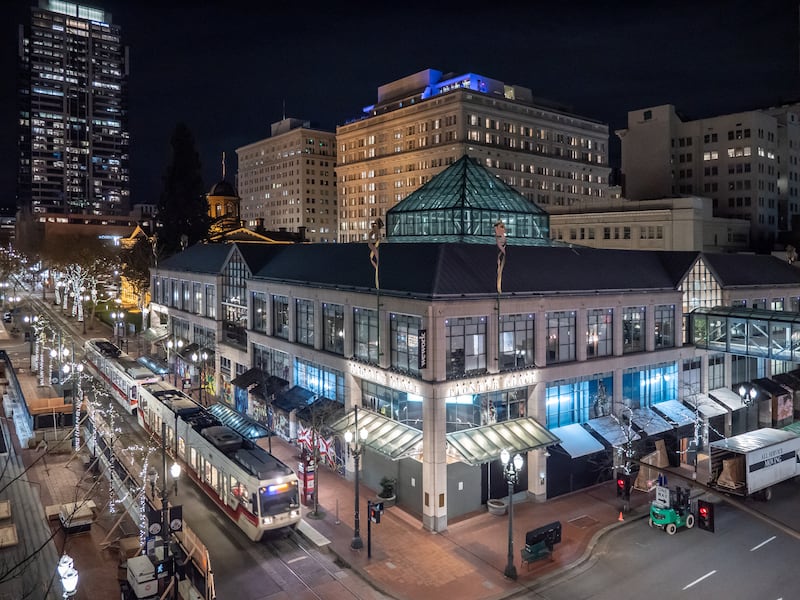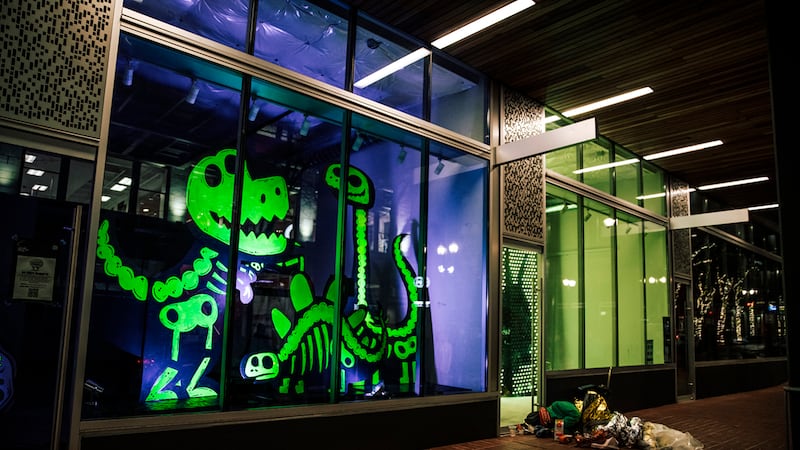Last week, managing partners from 25 of Portland’s largest law firms assembled on Zoom to air their grievances about downtown homeless camps to Sam Adams. In reply, he made them a remarkable offer.
Adams, the onetime Portland mayor, is now Mayor Ted Wheeler’s czar of homelessness and his liaison to business owners. On May 11, he had a virtual meeting with lawyers, many of whom have offices downtown. In attendance were partners from some of downtown’s biggest firms, including Barran Liebman, Perkins Coie, Schwabe Williamson, and Davis Wright Tremaine, all of which lease thousands of square feet of prime downtown real estate.
WW spoke to multiple people who attended the meeting. One moment stood out to everyone WW spoke with: Adams described the mayor’s plan to create safe camping sites for unhoused people in Portland neighborhoods. And he pledged the city would move homeless campers from downtown sidewalks into these new campsites.
Adams tells WW the mayor and City Commissioner Dan Ryan are currently working on a plan to erect safe camping spots all across the city and “understand the urgency of it.”
That plan has not been widely broadcast by the mayor’s office. (It’s not listed on the mayor’s website among his plans for restoring downtown.) For good reason: Adams went on to point out that the proposal is not going to be popular with homeowners in the neighborhoods where those sites would open. He told the law partners the mayor would need the vocal backing of their firms and other businesses.
Adams’ pitch and the meeting where it occurred display the pressures his boss currently faces. In the same discussion, law partners gave Adams a message to take to Wheeler: Within weeks, their employees will be allowed return to downtown law offices after more than a year of remote work. If the mayor doesn’t start getting tents off the sidewalks by the time employees come back, the firms may well leave downtown as their leases expire.
“They were frustrated and angry,” Adams recalls. “They all said: ‘We’re Portlanders, we love this city, we’re compassionate, we’re humane, but unless some order is brought to this disorder, we’ll be looking to change where we’re officed.’ They were very clear.”
A number of those in attendance recounted the conversation to WW, and the picture that emerges is one that Wheeler and Adams are hearing increasingly: Portland is days away from receiving the state’s sanction for its office towers to reopen. But many of the employees who fill those buildings are reluctant to return.
“He gave a lot of examples of things that are being done—there’s no shortage of things—but what’s the pace?” asks Andrew Schpak, a managing partner at Barran Liebman who attended the meeting. “I think it’s fair to say that some of the law firms are frustrated about the state of downtown and don’t necessarily feel like there’s a clear path forward.”
Wheeler may face a recall election this fall. The desire to unseat him is expressed most passionately by leftists angered by how he has handled policing and larger social justice issues. But Wheeler’s base is business interests, including those downtown law firms. If they don’t rally behind Wheeler, the mayor could be toast.
The frustration may also prove a pivotal moment for the vision of Portland’s downtown as its most important neighborhood. Since the 1970s, what made Portland unique was the idea that its downtown was a gathering place where all citizens could meet—to work, shop and play.
Now it’s a place that white-shoe lawyers are hesitant to set foot in.
What would be the result of their firms uprooting?
“Devastating,” Adams says. “Normally, downtown has upwards of 140,000 office workers, and the bulk of those are missing. To see that scatter outside downtown, you lose that critical economic mass that is absolutely essential to every great city.”

Adams tells WW the mayor and Commissioner Ryan are working on plans to erect safe camping sites in every part of the city, including downtown.
While Adams declined to say when those sites would be ready for use, he says they’re currently figuring out costs and thinking about potential locations.
The idea of the sites: sanctioned lots where people can park their tents and have access to sanitary facilities.
While his plan was met with support at the meeting, Adams went on to say the proposal will be controversial and need the outspoken approval of the law firms.
That’s partly because in the past, such sites have led to harsh backlash from neighbors adjacent to the sites.
It’s also because camping spaces are not a priority in Multnomah County Chair Deborah Kafoury’s proposed budget.
Metro voters approved a tax measure last year for homeless services—$53 million of which is allocated to Multnomah County, and which Kafoury proposes to spend mostly on permanent housing rather than temporary shelters.
That’s because voters approved the measure believing it would mostly go toward permanent housing, not short-term housing or shelter beds, says Denis Theriault, a spokesman for the Joint Office of Homeless Services.
“There’s an unfortunate myth out there about the kind of work voters wanted the Metro measure to fund,” Theriault says. “Housing people not only ends their homelessness, but that work can be done in just as much time, and sometimes less, than building shelters.”
In an email to WW, Kafoury calls the mayor’s plan a “back-of-the-napkin sales pitch” and says “they are afraid of being held to account and getting asked some tough but necessary questions [like], will people be forced by police to go to these camps or any other shelter settings they might be looking to create? Which neighborhoods have they identified for these camps? How will people be cared for and kept safe in these camps?”
Furthermore, Kafoury adds: “I’d also like to dispel a dangerous myth that some people, including the mayor and others, are spreading right now: that [temporary] shelter is faster, cheaper and that it solves homelessness. This is a demonstrable falsehood. It isn’t faster. It isn’t cheaper [than permanent housing]. And most importantly, it doesn’t help people end their homelessness. [The mayor] should know that a housing voucher is something that pays someone’s rent and can be immediate. It doesn’t take years. And yet, he is promoting this myth as a political tool, which is cynical and dangerous.”
Kafoury says the county will use most of its ARPA funds to manage the pandemic.
While those who attended the lawyers’ meeting say Adams did not offer any criticism of Kafoury, he told WW in an interview this week that Wheeler is no longer content to wait on Kafoury to share his priorities and says the city has its own funds from the American Rescue Plan—$108 million this spring and another $108 million later this year—that could be partly used to fund safe camping sites.
Adams says Wheeler will dip into it if Kafoury won’t budge.
“We think it should be something that both governments should participate in through the joint office,” Adams says. “We’re not giving up on any potential funding source at this point, but the mayor and Ryan are very focused on making these improvements.”
Adams’ meeting last week makes clear that downtown tenants have run out of patience. So have their landlords.
Vanessa Sturgeon, president and CEO of TMT Development—which owns Fox Tower, among other downtown properties—says she speaks regularly with Adams on the question of downtown camping.
She places the blame on Kafoury and other county officials. Sturgeon says Wheeler “doesn’t have the same sort of influence on that particular issue that people think he does. It’s the county’s responsibility.”
However, Wheeler is in an unusually vulnerable position. In July, his critics on the left will begin gathering signatures to recall him. None of those adversaries wants homeless camps swept.
But Wheeler’s reelection was backed by business interests that wrote checks to fund his narrow victory. Since November, he has done little to mollify them. If he can’t make headway on removing tents from in front of their buildings, they will likely remain neutral while Wheeler’s political fate hangs in the balance.
That’s the subtext of every threat to leave downtown.
In a neat symmetry, the next three months are also the period when big law firms will judge whether downtown has changed enough that their workers feel comfortable returning to the office.
“There’s a lot of drug dealing and open drug use on the street, and that freaks people out,” Sturgeon says. “People need to see some action in order to feel confident renewing their leases. It needs to happen by September, when most people plan to have business come back to work. It needs to be the focus of the summer.”
